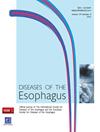咽鳞状细胞癌与晚期食管鳞状细胞癌的风险
IF 2.3
3区 医学
Q3 GASTROENTEROLOGY & HEPATOLOGY
引用次数: 0
摘要
咽部鳞状细胞癌是后来发生食管鳞状细胞癌的已知危险因素。我们调查了食管癌的风险是否高到足以证明在北欧人群中进行常规胃镜检查的合理性。如果咽癌患者发生腺癌的风险与巴雷特食管患者发生腺癌的风险相对应,则有必要进行监测。1980-2016年在瑞典28个病理部门获得的咽和食管活检的组织病理学数据与全国基于人口的医疗保健登记册相关联。我们计算了一个亚分布风险比(HR),比较了咽癌患者与匹配的一般人群中食管癌和死亡的风险。共有1399例咽癌患者被确诊。344人因年龄在18岁以下、既往食管癌、死亡或诊断后6个月内患癌症而被排除在外。因此,保留了1055例患者。中位随访时间为5.1年。78%为男性,诊断咽喉癌时的中位年龄为64岁。4例(0.38%)患者在随访期间发生食管鳞状细胞癌,相当于263例患者中有1例(HR = 14,32;95%ci = 1,55-132,30)。855例(81%)患者在随访期间死亡(HR = 7,65;95% = 6,82-8,59)。每年发生食管鳞状细胞癌的风险为0.07%,低于巴雷特食管患者的风险。因此,我们发现在咽癌患者中不支持长期内镜监测。本文章由计算机程序翻译,如有差异,请以英文原文为准。
428. PHARYNGEAL SQUAMOUS CELL CARCINOMA AND RISK OF LATER ESOPHAGEAL SQUAMOUS CELL CARCINOMA
Pharyngeal squamous cell carcinoma is a known risk factor for later squamous cell carcinoma of the esophagus. We investigated whether the risk of esophageal carcinoma is high enough to justify routine gastroscopy surveillance in a northern European population. If the risk among patients with pharyngeal carcinoma corresponds to the risk among patients with Barretts esophagus of developing adenocarcinoma, it could justify surveillance.
Histopathology data from pharyngeal and esophageal biopsies obtained 1980–2016 in Sweden’s 28 pathology departments were linked to national population-based healthcare registers. We calculated a subdistribution hazard ratio (HR) comparing the risk of esophageal cancer and death in patients with pharyngeal carcinoma to a matched general population.
In total 1399 patients with pharyngeal cancer were identified. 344 were excluded due to age under 18 years, previous esophageal cancer, death or cancer within 6 months of diagnosis. Thus, 1055 patients remained. Median follow up time was 5,1 years. 78% were men and median age at diagnosis of pharyngeal cancer was 64 years. Four (0.38%) patients developed esophageal squamous cell carcinoma during follow-up, equal to 1 in 263 patients (HR = 14,32; 95%CI = 1,55-132,30). 855 of the patients (81%) died during follow-up (HR = 7,65; 95% = 6,82-8,59).
The yearly risk of developing esophageal squamous cell carcinoma was 0,07%, which is lower than the risk among patients with Barretts esophagus. Therefore, we find no support for long-term endoscopic surveillance among patients with pharyngeal cancer.
求助全文
通过发布文献求助,成功后即可免费获取论文全文。
去求助
来源期刊

Diseases of the Esophagus
医学-胃肠肝病学
CiteScore
5.30
自引率
7.70%
发文量
568
审稿时长
6 months
期刊介绍:
Diseases of the Esophagus covers all aspects of the esophagus - etiology, investigation and diagnosis, and both medical and surgical treatment.
 求助内容:
求助内容: 应助结果提醒方式:
应助结果提醒方式:


